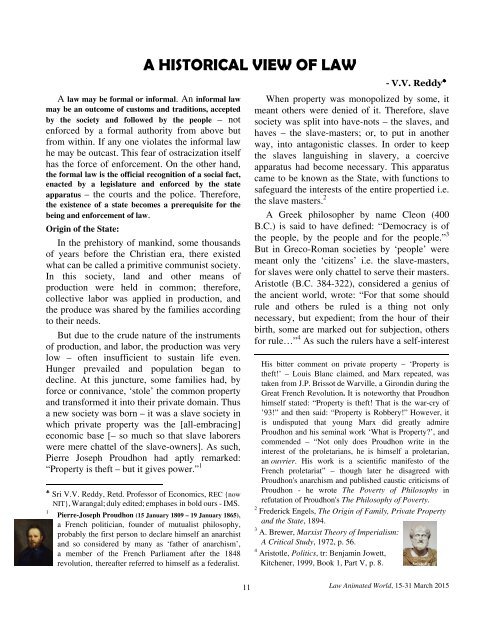Editor: I. Mallikarjuna Sharma Volume 11: 15-31 March 2015 No. 5-6
Martyrs memorial special issue of 15-31 March 2015 paying tributes to Bhagat Singh and other comrades.
Martyrs memorial special issue of 15-31 March 2015 paying tributes to Bhagat Singh and other comrades.
You also want an ePaper? Increase the reach of your titles
YUMPU automatically turns print PDFs into web optimized ePapers that Google loves.
A law may be formal or informal. An informal law<br />
may be an outcome of customs and traditions, accepted<br />
by the society and followed by the people – not<br />
enforced by a formal authority from above but<br />
from within. If any one violates the informal law<br />
he may be outcast. This fear of ostracization itself<br />
has the force of enforcement. On the other hand,<br />
the formal law is the official recognition of a social fact,<br />
enacted by a legislature and enforced by the state<br />
apparatus – the courts and the police. Therefore,<br />
the existence of a state becomes a prerequisite for the<br />
being and enforcement of law.<br />
Origin of the State:<br />
In the prehistory of mankind, some thousands<br />
of years before the Christian era, there existed<br />
what can be called a primitive communist society.<br />
In this society, land and other means of<br />
production were held in common; therefore,<br />
collective labor was applied in production, and<br />
the produce was shared by the families according<br />
to their needs.<br />
But due to the crude nature of the instruments<br />
of production, and labor, the production was very<br />
low – often insufficient to sustain life even.<br />
Hunger prevailed and population began to<br />
decline. At this juncture, some families had, by<br />
force or connivance, ‘stole’ the common property<br />
and transformed it into their private domain. Thus<br />
a new society was born – it was a slave society in<br />
which private property was the [all-embracing]<br />
economic base [– so much so that slave laborers<br />
were mere chattel of the slave-owners]. As such,<br />
Pierre Joseph Proudhon had aptly remarked:<br />
“Property is theft – but it gives power.” 1<br />
♣ Sri V.V. Reddy, Retd. Professor of Economics, REC {now<br />
NIT}, Warangal; duly edited; emphases in bold ours - IMS.<br />
1<br />
Pierre-Joseph Proudhon (<strong>15</strong> January 1809 – 19 January 1865),<br />
a French politician, founder of mutualist philosophy,<br />
probably the first person to declare himself an anarchist<br />
and so considered by many as ‘father of anarchism’,<br />
a member of the French Parliament after the 1848<br />
revolution, thereafter referred to himself as a federalist.<br />
A HISTORICAL VIEW OF LAW<br />
- V.V. Reddy ♣<br />
When property was monopolized by some, it<br />
meant others were denied of it. Therefore, slave<br />
society was split into have-nots – the slaves, and<br />
haves – the slave-masters; or, to put in another<br />
way, into antagonistic classes. In order to keep<br />
the slaves languishing in slavery, a coercive<br />
apparatus had become necessary. This apparatus<br />
came to be known as the State, with functions to<br />
safeguard the interests of the entire propertied i.e.<br />
the slave masters. 2<br />
A Greek philosopher by name Cleon (400<br />
B.C.) is said to have defined: “Democracy is of<br />
the people, by the people and for the people.” 3<br />
But in Greco-Roman societies by ‘people’ were<br />
meant only the ‘citizens’ i.e. the slave-masters,<br />
for slaves were only chattel to serve their masters.<br />
Aristotle (B.C. 384-322), considered a genius of<br />
the ancient world, wrote: “For that some should<br />
rule and others be ruled is a thing not only<br />
necessary, but expedient; from the hour of their<br />
birth, some are marked out for subjection, others<br />
for rule…” 4 As such the rulers have a self-interest<br />
His bitter comment on private property – ‘Property is<br />
theft!’ – Louis Blanc claimed, and Marx repeated, was<br />
taken from J.P. Brissot de Warville, a Girondin during the<br />
Great French Revolution. It is noteworthy that Proudhon<br />
himself stated: “Property is theft! That is the war-cry of<br />
’93!” and then said: “Property is Robbery!” However, it<br />
is undisputed that young Marx did greatly admire<br />
Proudhon and his seminal work ‘What is Property?’, and<br />
commended – “<strong>No</strong>t only does Proudhon write in the<br />
interest of the proletarians, he is himself a proletarian,<br />
an ouvrier. His work is a scientific manifesto of the<br />
French proletariat” – though later he disagreed with<br />
Proudhon's anarchism and published caustic criticisms of<br />
Proudhon - he wrote The Poverty of Philosophy in<br />
refutation of Proudhon's The Philosophy of Poverty.<br />
2 Frederick Engels, The Origin of Family, Private Property<br />
and the State, 1894.<br />
3 A. Brewer, Marxist Theory of Imperialism:<br />
A Critical Study, 1972, p. 56.<br />
4 Aristotle, Politics, tr: Benjamin Jowett,<br />
Kitchener, 1999, Book 1, Part V, p. 8.<br />
Aristotle<br />
<strong>11</strong><br />
Law Animated World, <strong>15</strong>-<strong>31</strong> <strong>March</strong> 20<strong>15</strong>



